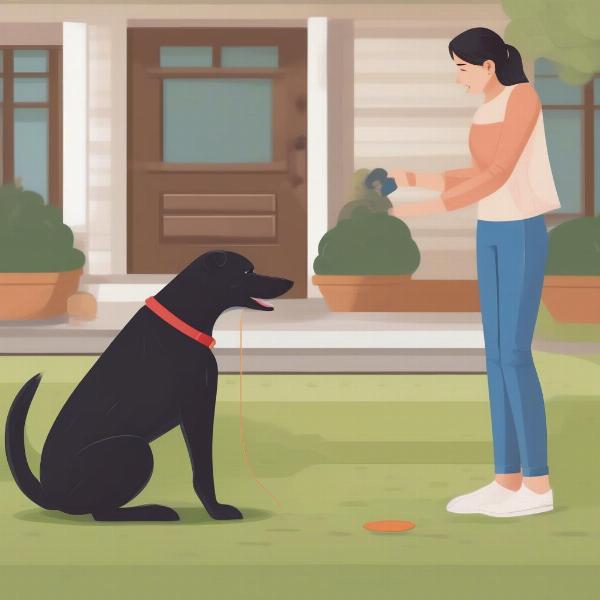Anti dog pee spray is a popular solution for pet owners struggling with unwanted urination in their homes. While these sprays can be a helpful tool, understanding their effectiveness, proper usage, and underlying causes of your dog’s behavior is crucial for long-term success. This guide will delve into everything you need to know about anti dog pee spray, from choosing the right product to addressing the root of the problem.
Understanding Anti Dog Pee Spray
Anti dog pee sprays generally work by deterring dogs from urinating in specific areas. Some use scent deterrents that dogs find unpleasant, while others utilize enzymatic cleaners to eliminate the odor of previous urine markings, which often encourage repeat offenses. Choosing the right type depends on your specific situation and the reason behind your dog’s inappropriate urination.
Choosing the Right Anti Dog Pee Spray
There’s a wide array of anti dog pee sprays available on the market. When selecting a product, consider the following factors:
- Ingredients: Opt for natural, non-toxic ingredients to ensure your dog’s safety. Avoid harsh chemicals that could irritate their skin or respiratory system.
- Scent: Look for sprays with scents that are specifically designed to deter dogs, such as citrus or bitter apple.
- Enzyme-based cleaners: If your dog is re-offending in the same spot, an enzyme-based cleaner is essential to break down the urine odor and discourage future marking.
- Surface compatibility: Ensure the spray is safe for use on the surfaces you intend to treat, whether it’s carpet, hardwood, or furniture.
Addressing the Underlying Cause of Inappropriate Urination
While anti dog pee spray can be a helpful tool, it’s crucial to address the underlying cause of your dog’s inappropriate urination. Several factors can contribute to this behavior, including:
- Medical issues: Urinary tract infections, bladder stones, or other medical conditions can cause increased urination and accidents. Consult your veterinarian to rule out any underlying health problems.
- Territorial marking: Unneutered males, in particular, are prone to marking their territory with urine. Neutering can significantly reduce this behavior.
- Anxiety or stress: Changes in routine, new pets in the home, or loud noises can trigger anxiety-induced urination.
- Submissive urination: Some dogs urinate when they feel scared or submissive.
- Inadequate house training: Inconsistencies in house training can lead to confusion and accidents.
Training and Positive Reinforcement
 Training and Positive Reinforcement
Training and Positive Reinforcement
House training requires patience and consistency. Take your dog out frequently, especially after waking up, eating, and playing. Reward successful outdoor urination with praise and treats. anti dog spray for peeing can help deter indoor accidents, but it should be used in conjunction with positive reinforcement, not as a sole solution.
Cleaning Up Accidents Effectively
When accidents happen, it’s essential to clean them up thoroughly to eliminate the odor and prevent re-marking. Use an enzyme-based cleaner specifically designed for pet urine. Avoid using ammonia-based cleaners, as the smell can resemble urine and encourage your dog to urinate in the same spot again.
Is Anti-Dog Pee Spray Safe?
Most anti-dog pee sprays are safe when used as directed. However, it’s essential to choose a product with natural ingredients and avoid those containing harsh chemicals. Always test the spray on a small, inconspicuous area first to ensure it doesn’t damage the surface.
Conclusion
Anti dog pee spray can be a helpful aid in managing inappropriate urination, but it’s crucial to address the underlying cause of the behavior for long-term success. By combining the appropriate spray with training, positive reinforcement, and addressing any potential medical issues, you can create a positive and accident-free environment for both you and your furry friend. Remember, patience and consistency are key.
FAQ
- Is anti dog pee spray harmful to dogs? Most sprays are safe when used as directed, but always choose a product with natural ingredients.
- Can I use anti dog pee spray on furniture? Check the product label to ensure it’s safe for use on the specific surface. anti pee spray for dogs often specify suitable materials.
- What if the spray doesn’t work? Consider the underlying cause of the urination. Consult your veterinarian to rule out medical issues and a professional dog trainer for behavioral advice.
- How often should I use the spray? Follow the product instructions for recommended usage.
- Can I use the spray on my dog directly? Never spray the product directly on your dog. It is intended for surfaces only.
- What other methods can I use to prevent indoor urination? Consistent house training, frequent potty breaks, and positive reinforcement are essential. pee post for dogs can be a useful tool.
- How do I remove the smell of dog urine from wood? Use an enzymatic cleaner specifically designed for pet urine and wood. You can find more tips on how to get dog pee smell out of wood
ILM Dog is your trusted resource for expert advice on dog care and training. We offer a wide range of resources, from breed selection to health and nutrition, to help you provide the best possible care for your canine companion. Whether you’re a seasoned dog owner or just starting out, dog spray for not peeing is just one topic we cover. For personalized guidance or to learn more about our services, contact us at [email protected] or +44 20-3965-8624. ILM Dog – Your Partner in Dog Parenthood.